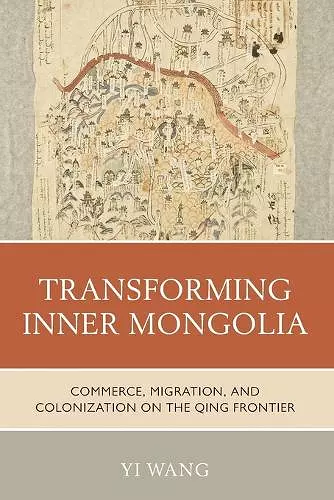Transforming Inner Mongolia
Commerce, Migration, and Colonization on the Qing Frontier
Format:Paperback
Publisher:Bloomsbury Publishing PLC
Published:8th Aug '23
Currently unavailable, and unfortunately no date known when it will be back
This paperback is available in another edition too:
- Hardback£97.00(9781538146071)

This insightful book explores the impact of Han Chinese migration into Inner Mongolia during the Qing period, revealing its profound historical significance.
This book provides a comprehensive analysis of the social, economic, and political consequences of Han Chinese migration into the borderlands that became Inner Mongolia during the Qing period. Yi Wang expertly links local history to global movements, tracing how Inner Mongolia was integrated into what would evolve into the nation-state of China, and subsequently into a global capitalist economy. Through her detailed examination, readers gain insights into the complex dynamics at play during this transformative era.
In Transforming Inner Mongolia, Wang presents the first in-depth history in English that highlights the significant effects of Han Chinese migration during the Qing era. She delves into the processes of commercial expansion, land reclamation, and Catholic proselytism that reshaped the Mongol frontier long before it was officially colonized. By reconstructing the socioeconomic, cultural, and administrative history of Inner Mongolia, Wang illustrates how these developments contributed to China's broader integration into the global frameworks of capitalism and the nation-state.
Wang introduces a peripheral and transregional perspective, connecting local and regional processes to global trends. She emphasizes both macro-historical analysis and detailed micro-studies of specific regions and agents. Her argument posits that border regions like Inner Mongolia were pivotal in China's transformation from a multiethnic empire to a modern nation-state, serving as a testing ground for economic and administrative innovations. Drawing on a diverse array of sources, this work makes a significant contribution to the fields of Inner Asian history, border studies, and migration history.
Yi Wang puts the colonization of Inner Mongolia in a new context: world markets, capital, land, and labor. Her documentation of capitalist agriculture in the Hetao region makes a powerful intervention in debates over China's premodern economy. -- Christopher Atwood, University of Pennsylvania
In this theoretically sophisticated study, Yi Wang marshals a stunning array of sources—from corporate legal documents to folk songs—to reveal the fascinating history of the colorful cast of characters—including Manchu officials, Chinese irrigation entrepreneurs, Russian merchants, and Belgian missionaries—who played a role in integrating Inner Mongolia into the Qing state. In so doing, she reveals not only how the global processes of imperialism, capitalism, environmental degradation, migration, and nationalism shaped this particular borderland region but also how Inner Mongolia was the crucible that forged modern China. -- Johan Elverskog, Southern Methodist University
If you haven't thought of the Chinese as settler-colonists, think again. Yi Wang explores in remarkable depth one of the great frontier movements of modern times, the Chinese colonization of Mongolia, with a passion reminiscent of Owen Lattimore. Her careful account of how the Mongols lost their lands—under relentless pressure by Chinese merchants, the global economy, and the centralizing Chinese state—gives us a clear example of how Chinese ‘secondary imperialism’ worked. -- Peter C. Perdue, Yale University
Current Chinese policies in the Inner Mongolian Autonomous Region have brought the plight of the Mongolian population in the People’s Republic of China to a wider audience. In truth, current events are but a continuation of oppression that began long before the establishment of the People’s Republic. It is, in essence, a legacy of changes that occurred during the Qing Empire. Inner Mongolia has long been a borderland between steppe and sown, but not until the 19th century did it attain a majority sedentary population. In this study, Wang amply demonstrates that the transformation of Inner Mongolia was not a monocausal event. Rather, it was the culmination of Qing policy, environmental and economic issues, and the unintended consequences of the presence of Christian missionaries in the region and European imperialism. These factors resulted in clashes between the Mongolian population and Han immigrants, which transformed Inner Mongolia not only culturally and demographically, but also economically, environmentally, politically, and socially. Wang’s work is an exemplar of the New Qing History and will benefit anyone interested in the region, regardless of era.This book is highly recommended for advanced undergraduates through faculty. * Choice Reviews *
Transforming Inner Mongolia is a textbook that reads like a novel. It presents complex aspects of a completely foreign culture and makes them readable and understandable to any reader, even those with very little knowledge of Chinese or Asian history. The book also reiterates the importance of the primary dictates of expansion and migration – commerce and resources. We highly recommend this thought-provoking book. * Books for Congress *
Transforming Inner Mongolia is meticulously researched and eloquently written, which stands as a timely addition to the rapidly expanding body of scholarship on Qing borderlands and their integration into modern China. Encompassing many inspiring arguments, it will surely stimulate more studies on the perennial subjects of peripheries, frontiers, and borderlands. * Asian Affairs *
ISBN: 9781538183670
Dimensions: 229mm x 153mm x 18mm
Weight: 485g
354 pages